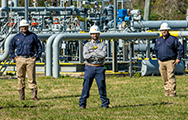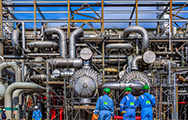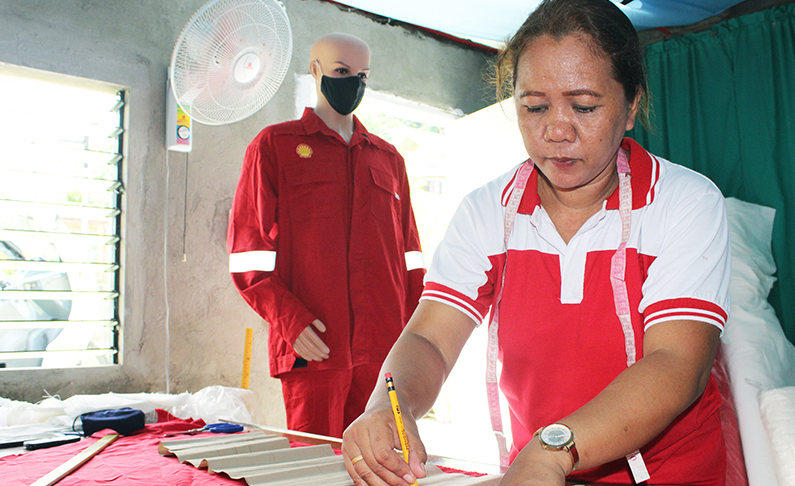Working with our suppliers
Supply chain
Shell aims to work with suppliers, including contractors, that behave in an economically, environmentally and socially responsible manner, as set out in our Shell General Business Principles and Shell Supplier Principles.
In 2020, Shell spent around $39.3 billion on goods and services from around 29,000 suppliers globally.
Supply chain in 2020
Suppliers
Goods and services
Our suppliers are critical to our ability to run our businesses. They are involved in almost every step of our operations – and are often key to having a positive impact on local communities and achieving successful business outcomes.
Making lower-carbon choices
We continually work with our suppliers to find ways to reduce greenhouse gas emissions across our supply chains.
In 2020, we worked with them to jointly identify the best-performing lower-carbon equipment available and call attention to these products in the catalogues Shell employees use to place orders for projects. The aim is to make it easier to choose products that can drive sustainability deeper into our projects and facilities. For example, by choosing more energy-efficient electrical motors rather than older steam turbine technology at a refinery.
We also designed a new interactive tool for suppliers to set a target and track, among other things, their emissions performance against other suppliers to Shell in their industry. The Shell Supplier Energy Transition Hub was created in collaboration with 50 of our major suppliers, who began trialling it in 2020. We expect to roll it out to other suppliers starting in 2021.
Reducing waste
We are working with our suppliers to help develop a circular economy, where products are made with the least amount of waste and can later be recycled or reused.
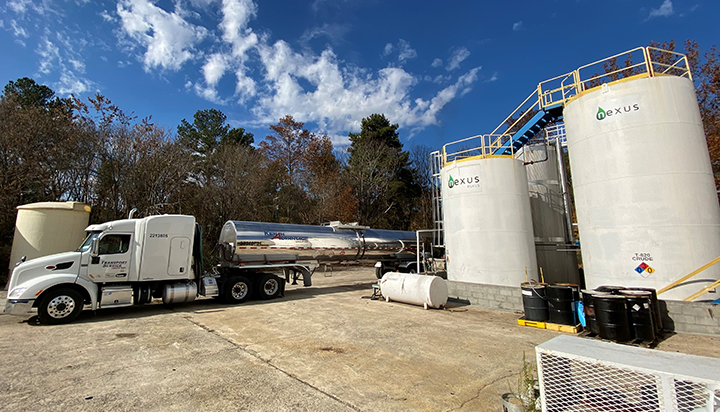
Shell and Nexus Fuels LLC have a supply agreement for pyrolysis liquid made from plastic waste, which is then converted into chemical products.
We have worked together on ways to transform plastic waste into feedstock for Shell’s chemical plants (see Plastics) and to use waste-water slurry for fuel instead of burning it as waste. We are also working together to develop reusable packaging solutions for our lubricants and retail operations. In 2020, we launched a waste management programme to reduce, reuse and recycle waste across our global operations.
Suppliers are also playing an important role in recycling materials when we decommission projects. For example, in the UK, our contractors have recycled more than 97% of the first two decommissioned Brent platform topsides – the parts that are visible above the sea.
We are also supporting this change to a circular economy through our procurement choices, which are the type of responsible commercial decisions that customers expect us to make.
Supply chain priorities
Working with our suppliers to establish competitive supply chains that are safe, sustainable and digitally connected
Supporting people
Our core values of honesty, integrity and respect for people underpin our work. We focus on ensuring that suppliers working at our sites care for their people. We carry out reviews of their approach to worker welfare.
We work to respect the rights of people employed in our supply chains. We require all our suppliers to meet and comply with our safety standards and with our approach to human rights and modern slavery. For certain high-risk contracts, suppliers must also comply with our worker welfare requirements (see Safety, Respecting human rights, and Modern slavery).
We also support local businesses and suppliers in the countries where we operate (see Local content).
Read more about how we work with contractors and suppliers at www.shell.com/shell-for-suppliers
Internal voice

Mingran Tang
Shell Contracting and Procurement
Mingran is the executive vice president for Shell's global contracting and procurement organisation. She is based in the Netherlands and employed by Shell Global Solutions Services B.V.
“When the first COVID-19 restrictions began in early 2020, it quickly became clear that this was an unprecedented challenge facing our global supply chain. This was different from the previous financial crisis. It was a pandemic. We responded to this urgent health challenge for our suppliers around the world. For example, we supported our business partners to set up extra accommodations for front-line contractors to allow for greater social distancing. We used our global supply network to source masks and ventilators to fill shortages in some communities where we operate. For key local suppliers who struggled financially, we introduced a range of supportive measures, including fast-tracking of payments. Today, Shell continues to work in whatever way we can to bring suppliers with us through the pandemic.”
Local content
We want to make a positive difference to countries and local communities. We do this by creating jobs, training people, supporting local businesses and buying goods and services from local suppliers – collectively referred to as local content.
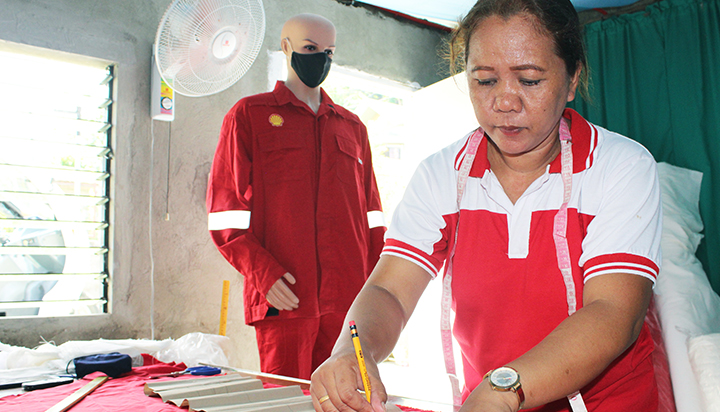
The SIBBAP Multipurpose Cooperative participates in the LiveWIRE programme in the Philippines.
In 2020, Shell companies spent $39.3 billion on goods and services, of which 84.5% was purchased from suppliers based in the same country of operation, also called local procurement. About 67.5% of our procurement was in Australia, Canada, the Netherlands, the UK and the USA, of which 85.5% was spent with local suppliers.
We estimate that around $4.5 billion was spent in countries that, according to the UN Development Programme's Human Development Index 2019, have a gross domestic product of less than $15,000 a year per person. In these countries, Shell companies spent around 83.5%, or around $3.7 billion, with local suppliers.
Shell local content activities in 2020
Goods and services
spent globally on goods and services
Countries
spent in Australia, Canada, the Netherlands, the UK and the USA
Low-income countries
spent in countries where gross domestic product is less than $15,000 a year per person[A]
Local procurement
spent in these low-income countries with local companies
[A] According to the UN Development Programme's Human Development Index 2019
In 2020, our community skills and enterprise development programmes created 1,805 jobs, supported 1,017 businesses, and added 99 entrepreneurs to our supply chains globally (see Community skills and entrepreneurship).
Contributing to the local economy
Our contribution to the development of individual countries is an important part of our support for decent work and economic growth, Goal 8 of the UN Sustainable Development Goals.
In 2020, for example, we completed an analysis of the long-term contribution to the national and local economy of our gas-to-liquids plant in Sarawak, Malaysia. We found, among other things, that for every dollar of gross value added produced by the plant, an additional $1.19 is generated for other sectors of the national economy, mostly in Sarawak. And of the 436 employees at the plant in 2019, 99% were Malaysian and 89% from Sarawak state. From 2009 to 2018, most of the plant’s spend on goods and services was in Malaysia, with a significant amount in Sarawak.
To help our suppliers through the difficulties of the COVID-19 pandemic, we have provided support in some countries, including faster payment of invoices, grants and funding for small local suppliers, and transit centres for travelling contractor staff.
Discover more about how we work to support the countries in which we operate: www.shell.com/sustainability/communities/local-employment-and-enterprise
External voice

Jeff Geipel
Mining Shared Value
Jeff is the founder and managing director of the Mining Shared Value initiative at Engineers Without Borders Canada, a non-governmental organisation that works to increase the social and economic benefits of global extractive industries by promoting the use of local suppliers.
“We have engaged with Shell in the last couple of years to explore ways it can continue to strengthen transparency about the economic impact of its procurement of goods and services. Buying from suppliers in host countries is one of the most meaningful ways that major investing companies and the oil and gas industry can contribute to local economies. Managing this well means tracking and publicly sharing how much is being spent. More international companies are being asked by investors, regulators and consumers to provide detailed information on their local procurement, as well as on how they conduct due diligence in supply chains to avoid corruption and problematic supplier practices. The global oil and gas sector spends around $800 billion each year on procurement, so transparency is vital to helping ensure effective governance of natural resources.”


